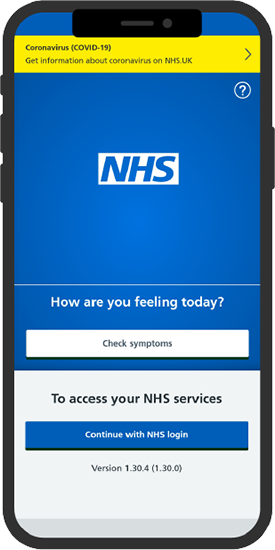We use cookies to help provide you with the best possible online experience.
By using this site, you agree that we may store and access cookies on your device. Cookie policy.
Cookie settings.
Functional Cookies
Functional Cookies are enabled by default at all times so that we can save your preferences for cookie settings and ensure site works and delivers best experience.
3rd Party Cookies
This website uses Google Analytics to collect anonymous information such as the number of visitors to the site, and the most popular pages.
Keeping this cookie enabled helps us to improve our website.
Your GP health record
You can view your GP health record using the NHS App or by logging into your NHS account on the NHS website.
You can create an account if you do not already have one.
To view your GP record online, you must be:
- registered with a GP surgery
- aged 16 or over
When you create an account, you'll need to prove your identity before you can view your GP health record. This helps keep your record secure.
You can view your health record and nominate someone you trust to access it on your behalf.
The NHS App
Redgate Medical Centre would like to invite you to use The NHS App
Owned and run by the NHS, the NHS App is a simple and secure way to contact your GP and access a range of NHS services on your smartphone or tablet.

Setting up an NHS account
To set up your NHS account for the first time, you will need to set up an NHS login.
Once you have set up your NHS login, you can log in to your NHS account or download the NHS App onto your phone.
To link your GP health record with your NHS account, you will need to register for online services.
Application for Online Services
Proxy access
You may find it helpful if a trusted family member, carer, or close friend is able to access your online medical record on your behalf. This is known as 'proxy access' and can be used for tasks such as ordering repeat prescriptions, booking appointments, and more.
If you do not want someone else to have access to your GP health record, you can:
-
Refuse to give consent when asked
-
Withdraw consent at any time, even if you previously agreed
To remove or prevent proxy access, please contact the practice.
Children under 16
To enable proxy access for a patient 11 years or older, we may need to speak to the child directly to ensure they understand what access to the their records may entail.
Before granting you access, we may need to check:
- ID for you and the child, for example passports
- documents that help to prove you have parental responsibility, for example a birth certificate
- with anyone else that shares parental responsibility with you
- for safeguarding issues
- that the child consents to your access (agrees to it) or lacks capacity to consent, if they are aged 11 or over
You can have proxy access for more than 1 child, and a child can have more than 1 proxy acting on their behalf.
Children's rights, capacity and consent
Children have the same legal rights over their personal health information as adults. This means we must speak directly with the child to obtain their consent before allowing someone else to access their online GP record—if the child is able to understand and make an informed decision. This is known as having capacity.
Children 11 or over are usually considered to have the capacity to consent to or refuse access, unless they have a medical condition or learning disability that affects their ability to understand.
If you believe your child may not fully understand what it means to give you access to their online GP services, please let us know.
In these cases, a GP will make a decision based on the best interests of the child. This will usually mean giving access to a parent or legal guardian to act on the child’s behalf.
